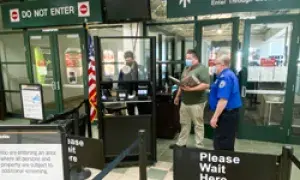
What does lowering the speaking volume on Detroit Metropolitan Wayne County Airport’s (DTW) checkpoint have to do with reducing injuries?
To get the answer, lace up your comfortable walking shoes and follow Richard Dessin to a busy checkpoint at 5 a.m. There in the wings, the DTW occupational safety and health specialist observes officers in his typical hands-on style.
“One of the first things I noticed about the checkpoint is how everyone yells,” said Dessin.
Advocating a more focused approach, he directed officers to address four or five passengers at a time in a normal speaking voice. Dessin said the calmer atmosphere reduces stress and limits injuries caused by hasty movements.
“I try to lower the stress of the environment,” said Dessin. The quite atmosphere is a win for anxious passengers, too.
A Marine Corps veteran with consecutive Afghanistan combat tours, Dessin approaches his job with a military mindset. Look at the problem, find a solution, solve the problem.
In his five years as a safety and health specialist, he’s shifted attitudes on safety to an “all in” posture, producing a buy-in from the front line and welcomed support from Michigan Federal Security Director (FSD) Steve Lorincz and Assistant FSD and Designated Occupational Health and Safety Officer (DOSHO) Salvatore Badalamenti. Dessin credits DTW Supervisory Officer Matthew Karchnick for much of the evolution. Karchnick serves as TSA Michigan’s uniformed safety chair.
“Matt is a huge contributing factor to the success of what we have accomplished,” said Dessin. “Without his insight as a blue shirt supervisor and perspective into the TSA checkpoint operation, many of our projects would have fallen flat.”
The admiration is mutual.
“I’ve had the pleasure of working with Richard from his beginning with TSA and have witnessed the fundamental changes at DTW resulting in a safer environment for each employee and passenger,” said Karchnick.
Culture shift produces best practices
When it comes to safety, TSA Officers at DTW are now proactive instead of reactive. Dessin inherited checkpoints that were poorly maintained for a variety of reasons. Now, though, you won’t find TSA tape binding dangerously sharp parts of a broken search table or chair at DTW. Dessin inherited checkpoints that were poorly maintained for a variety of reasons.
“Marines are well known for making it happen with duct tape and bailing wire,” said Dessin. “So when I transferred to TSA DTW, I could not help noticing all the TSA tape everywhere. The officers had accepted their environment, but were still getting the job done. I knew there had to be a fix for all that.”
Instead of playing the blame game, he not-so-quietly went to work with leadership and stakeholders replacing broken, worn chairs, stainless steel tables and substandard lighting.
At the beginning of the pandemic, he was instrumental in securing face shields made by Ford Motor Company, first for DTW, and then for other airports around the country.
In a move some may see as counterintuitive when long wait times are looming, he promotes the “one passenger, one bag at a time” school of thought, avoiding hasty, hurried movements. Focusing on the job at hand reduces injuries from overexertion and trips and falls.
Tackling issues head on with a holistic, problem-solving approach has netted Dessin and this team of CDSOs success. DTW is in the top four large hub airports scoring high in federally regulated safety and health requirements. Year over year, an OSHA Federal Agency Targeting Inspection Program stat measuring workforce lost time case rates for the second quarter show DTW cutting non COVID-19 reported injuries in half.
Dessin realizes he and his CDSOs can’t stop all injuries, but in an atmosphere that changes moment by moment, Team Michigan is consistently on the floor shaping positive safety practices.
By Karen Robicheaux, TSA Strategic Communications and Public Affairs

